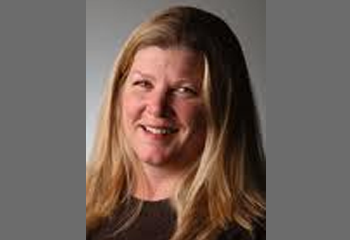Nurse Colleen Groll champions reductions in hospital waste and energy use

Colleen Groll
Nurse Colleen Groll, the manager of sustainability programs at Seattle Children’s Hospital, is engaging hospital nurses in waste and energy reduction through the Nurses Climate Challenge.
Colleen Groll remembers watching footage of the Vietnam War on the news every night when she was growing up.
Groll, Seattle Children’s Hospital sustainability manager, said the intense images of the war and injured soldiers compelled her to become a nurse. While the war ended when she was a junior in high school, her “path was already set.”
After working as a nurse in the intensive care unit for several years, Groll decided to become a nurse practitioner when she had a “wonderful” checkup with a nurse practitioner.
“I thought, ‘my goodness, what a wonderful role,’” she says.
Alongside her work as a nurse, Groll began to renovate houses. She started becoming more and more interested in making her construction environmentally-friendly. Groll later changed careers to focus on green building consulting and worked at O’Brien & Company for five years.
Still, Groll noted she didn't make the connection between sustainability and health care until a few years after working on building design. She kept eyeing job listings focused on sustainability work in hospitals.
“I just couldn't get over that I could combine these two passions of sustainability and health care,” she says.
Groll began work with Seattle Children’s in 2013. In her new role, she was excited to address energy and water use, transportation, and the supply chain in the hospital. As with her previous personal and professional construction projects, she wanted to investigate how to make the health facility more sustainable.
“It just felt like [I was] never going to run out of things to work on,” she says.
Currently, Groll says her focus is the “big three” – energy reduction, waste reduction, and water reduction. She adds the most challenging aspect of her job is finding ways to make the hospital’s supply chain more sustainable, especially with the mass purchasing of plastic materials.
“It's very complex, and hospitals purchase thousands and thousands of items,” she says. “Green purchasing is something I'm pretty passionate about.”
Groll said hospitals are both part of the problem and part of the solution when it comes to climate change. She finds it energizing to see more hospitals, like Seattle Children’s, involved in efforts to mitigate climate change.
“It was very exciting to be able to focus my energy on such a great opportunity for change,” she says. “Hospitals can both decrease their greenhouse gas contributions to climate change, and step up and lead on this issue. Climate change should be a public health issue, not a political one.”
Groll says she frequently presents at staff meetings on topics like climate change and sustainability, and she encourages others to discuss strategies to reduce carbon emissions. She is excited to join the Nurses Climate Challenge because it is a chance to bring nurses directly into the conversation about climate change and pediatric health, noting children are one of the most vulnerable populations to the effects of climate change.
“Any way to engage staff in sustainability is a win,” she says. “There are so many competing interests in health care, so being able to bring some clarity and regional information on climate change to our staff is great.”
Groll has given three presentations using the slides and resources from the Nurses Climate Challenge. Her audience was comprised of nurses and medical assistants and she interspersed the Nurses Climate Challenge slides with sustainability metrics from Seattle Children’s.
Earlier this year, Groll was also invited to speak at the Seattle Children’s neonatal nursing grand rounds.
“The reception has been great,” she says. “Staff want to make a difference and lower their own carbon footprint after seeing the presentation.”
Join the Nurses Climate Challenge, and share this opportunity with your colleagues and students today.
